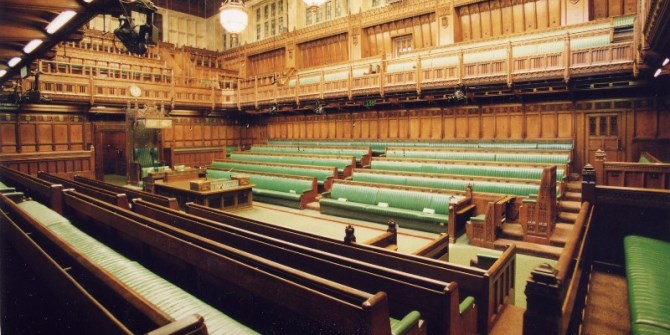 Andrew Blick argues for removing decisions about constitutional change from the immediate sphere of party politics. This may allow for House of Lords reform and other issues that have been difficult to resolve in the traditional manner.
Andrew Blick argues for removing decisions about constitutional change from the immediate sphere of party politics. This may allow for House of Lords reform and other issues that have been difficult to resolve in the traditional manner.
The collapse of House of Lords reform leaves issues involving the second chamber, principally its composition, unresolved. Abandonment of coalition policy in this area also draws attention to the way in which constitutional change is brought about in the UK.
The full assessment of UK democracy recently produced by Democratic Audit raised concerns that constitutional alteration in the UK is not brought about in a sufficiently impartial or inclusive fashion. The Audit noted a key feature of the ‘unwritten’ UK constitution. Strictly speaking, all that is required for the constitution to be modified is for the UK Parliament – which is often described as ‘sovereign’ – to act alone using its regular legislative procedures. In fact, simple majorities in only one House of Parliament, the Commons, are sufficient to secure nearly all kinds of change, since the veto powers of the House of Lords are significantly limited by the Parliament Acts 1911/1949. And just as Parliament can bring about change in this straightforward way, it can block it simply by not acting. In other words, constitutional change can be very easy for the group controlling the Commons, and very difficult for everyone else if that group does not agree.
This arrangement gives rise to two questions: the first which asks if it is satisfactory and the second, if there is a better approach available.
The supreme legal position of Parliament means that as well as being one player amongst many within the constitutional framework, it is also able unilaterally to alter that framework. A conflict of interest arises. Parliament can even change rules applying to its own operation, as it did recently with the Fixed-term Parliaments Act 2011, which created a standard parliamentary term (of a controversially-long five years) and placed the triggering of dissolutions on a statutory basis. Equally, opposition from within Parliament to a possible change to its composition, as with Lords reform, can prevent it from taking place.
Moreover, since the dominant group in the Commons, the preeminent House of Parliament, also forms the government, there is a danger of constitutional changes being brought about which are inappropriately biased in favour of the UK-level executive. For instance, legislation is frequently passed by Parliament which transfers powers from local government to Whitehall.
In addition to that of conflict of interest, the second problem is that Parliament is able to act unilaterally, minimising outside involvement. The principle that a constitution should be subject to broad social ownership and should not be the property of any one institution or group is thereby challenged. It should be noted that Parliament can if it chooses provide for referendums on issues (it has done so increasingly, for instance, over devolution); and it can legislate to make the outcomes of those referendums binding (as are referendums under the European Union Act 2011). However, many recent substantial changes – such as the Human Rights Act 1998; the Freedom of Information Act 2000; the Constitutional Reform Act 2005; the Constitutional Reform and Governance Act 2010; the European Union Act 2011; the Localism Act 2011 and the Fixed-term Parliaments Act 2011 – did not involve referendums; and in some cases even basic standards of consultation were not adhered to.
Nonetheless the use of referendums demonstrates that, regardless of the strict legal position, Parliament operates subject to practical constraints when it seeks to alter the constitution. In some circumstances additional processes will be judged necessary to legitimise an alteration, and the outcome may be that a proposal is rejected, as with the referendum on a directly elected assembly for the North East region of England in 2004. Conventions have developed to the effect that Parliament cannot legislate for devolved matters without agreement at devolved level. It also seems that there is emerging a principle that nations or areas can secede from the UK, subject to the approval of their populations in referendums, with the UK Parliament, legal niceties notwithstanding, unable to prevent them.
However, decisions by Parliament about whether to permit wider involvement in constitutional change involve political calculations rather than clearly defined rules.
How might constitutional modification be handled differently? First, most other democracies have ‘written’ constitutions which define what the consitution is and how it can be amended. Consequently, it is not for a government or national legislature to decide what procedures need to be applied to any given change, rather there are fixed regulations to be followed. Second, the basic legal requirements to be fulfilled if a constitution is to be altered are likely to be more demanding than those of the standard procedures of the legislature. For instance, some kind of legislative supermajority threshold might be involved, or obligatory referendums. By these means constitutional change is made dependent upon a higher degree of consensus than is often the case in the UK.
But such stipulations would not deal with the particular issue presented by the dropping of House of Lords reform. While they might become more dependent upon others for bringing about changes, Parliament or the dominant group within the Commons would still often possess a veto. If they did not want to pursue a particular proposal, it would probably not proceed, regardless of the views of others.
Bypassing this problem might involve finding ways to remove decisions about constitutional change from the immediate sphere of party politics. The Scottish constitutional convention which sat from the late 1980s, including members of different parties and various civil society groups, was able to create substantial momentum around the proposals it developed for devolution. Over the last decade there have been experiments with citizens’ assemblies in Canada and elsewhere, selected from the general public by lot (sortition), as a means of considering possible electoral systems, away from the usual policy-making environment.
Perhaps such a body could be deployed effectively in the UK to consider House of Lords reform and other constitutional issues which have proved difficult to resolve. Through such methods the ends of impartiality and inclusiveness in constitutional change might be well served.
Note: This article gives the views of the authors, and not the position of the British Politics and Policy blog, nor of the London School of Economics. Please read our comments policy before posting.
Dr. Andrew Blick is Senior Research Fellow at Democratic Audit.







